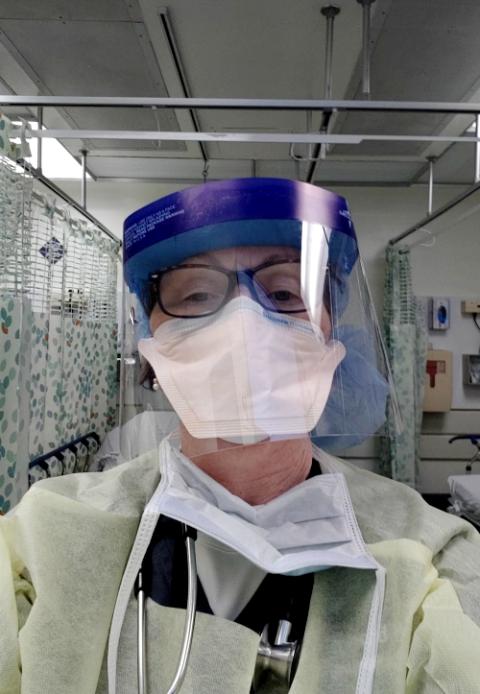
Presentation Sr. Mary Catherine Redmond (Provided photo)

Presentation Sr. Mary Catherine Redmond (Provided photo)
Earlier this month, we had the last meeting of the Palliative Care-COVID Support Care Team. This was a group of emergency providers put in place a month before to answer the overwhelming demands of patient end-of-life needs, connections of families to patients, and continued communication with those who could not visit their loved ones.
We met every Monday through Friday at 1 p.m. to discuss cases and prioritize the needs of that day. We worked tirelessly with staff and families and met many more patients than we ever could have imagined who were fighting this COVID-19 war. And yes — I say war because of the number of deaths we witnessed and helped families through.
We were providers from all different departments — OB/GYN, family practice, psychiatry, social work, pediatrics, emergency medicine — and a volunteer psychiatrist and Navy RNs deployed to our hospital. We facilitated many phone calls, iPad visits, coordination of personal "last time" visits to patients at the end of life, and many walks to the morgue to view the bodies of loved ones.
We organized volunteers — medical and physician assistant students who were home and not on rotations — to write sympathy notes to the families of all who died. We used donated hand-crocheted blankets to cover patients who were at the end of life; a little piece of life that gave some semblance of personal belonging.
As I got in the car after that last meeting, I had an overwhelming sense of gratitude, relief and loss. I was grateful for the many intimate conversations I had had with families about their loved ones. I learned so much of their personal stories and the stories of their families. What mattered to them and what they loved. It was a sacred place to be, amid such grief.
The relief I felt came from the realization that I would not be going to the hospital as much as I had during the crisis. I now have a little more time for me, my own prayer and processing. The loss was the most overwhelming. I remembered names of patients and families, conversations that weigh heavy on my heart. It was like a litany of saints in the car as I remembered each by name. There were so many.
The conversations at the time of death stood out, because as a result of the earlier conversations, I was now a part of the story. I described the last moments of death to the family, as I was present for many of them. I explained to the families the number of caregivers around the bed of their loved one, the nurse holding the hand and others holding a silent vigil as the last breath was taken and the monitor and ventilator were turned off.
Advertisement
I had said to one daughter, also a health care provider who did not make it to the hospital for her father's death, "It was very peaceful. He just slipped away." Later that afternoon as we walked back from the morgue, she said through her tears, "You were right. He did look so peaceful."
Another family who wanted one last iPad visit said, "OK, that's enough," and I asked if there was a prayer they wanted to pray together with their loved one. They wanted to sing a song and so "He Lives" rang out into the room from the iPad as tears streamed down my face.
I remembered so many and hold them and their families in prayer.
The Palliative Care-COVID Support Care Team was an awesome group of volunteers who held the same desire to connect families and patients and provide the most loving, peaceful, caregiving experience for so many patients' end of life. Several of our team lost family members during our time together. We held them as well and knew that what was happening among and through us was special and sacred.
It was hard to leave the room that day. Many of us, who had never known each other before, all working in different departments, now felt a common bond, a life story that would bind us forever. We shared what the experience had meant for us. We took a group picture — one shoulder to shoulder with masks on and one funny one — showing muscle and confirming that we were NY Strong.
As the makeshift intensive care units are reduced in number, we now realize that our regular positions are vacant and our own departments need us again as providers.
As we move to Pentecost, I am struck by the gifts of the Spirit that move through us and I beg for the gifts I need at this time. I was conscious of the many days coming up, especially Mother's Day and Father's Day, that will be so enormously painful for so many who have lost mothers, fathers, sons and daughters.
And yet I believe now, more than ever, we need the gift of the Spirit to bless us, blow among us and anoint us with the gifts we need. There are so many, many needs. That gift of the Spirit will hold us as one as we continue to speak our own language of what COVID-19 has meant for us. May the stories we share and the gift of the Holy Spirit bring us life, healing, hope and peace. This is my prayer.
[Mary Catherine Redmond is a Sister of the Presentation of the Blessed Virgin Mary. She has ministered in various aspects of health care and is currently serving as chief physician assistant in hospital emergency medicine, serving the underserved of New York City.]






